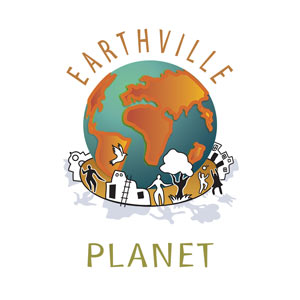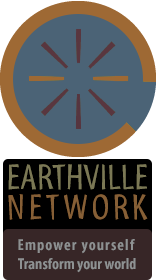
If you’ve already read our main article on Sustainable Thriving, let’s take a closer look, exploring what sustainable thriving would look like on the personal, societal, and planetary levels.
Below, we outline six aspects of sustainable thriving: three aspects of sustainability and three aspects of thriving, each applied to the personal, societal, and planetary levels.
In this model, sustainability represents a bare minimum acceptable state, while sustainable thriving represents the ideal.
We’ll explore each of these aspects in some detail, to render a clearer picture of what a sustainably thriving world world would look like. Of course this is not a comprehensive list of cures to all the world’s ills, but it covers a lot of the foundational issues that must be addressed in order to make way for many other improvements we would like to see.
Note that this list is complied from experience gathered in different corners of the world, and some of these issues might seem to be of greater importance in some countries and less in others, but it’s the whole world we’re talking about here so we’re including all of it, for a more balanced view.
Planetary Sustainability:
- Biological systems remain diverse and productive over time.
- Environmental toxicity (pollution) remains below levels harmful to life.
- Endangerment of species as a consequence of human society is avoided.
- Natural resources are conserved (not depleted by being used faster than they are generated).
- Thus, a viable ecological balance is maintained consistently over the long term.
Planetary Thriving:
- All species flourish within their natural limits (as they did before industrialization).
- Natural resources are not merely adequate but abundant relative to the needs of humans and other species.
- The self-healing mechanisms of the ecosystem (e.g. carbon sequestration by forests and the self-cleaning of the oceans) return to healthy functioning (beyond the minimum necessary for merely avoiding further damage), reversing the tide of degeneration and enabling gradual restoration.
- Natural beauty increases rather than declining.
Societal Sustainability:
- Distribution of resources throughout human society is equitable enough to eliminate the social maladies of poverty (hunger, preventable diseases, social/political/economic instability arising from popular discontent, etc.).
- Every person who needs to earn a living is able to find work that she is physically able and emotionally prepared to do, which will pay her at least a living wage, and where she will be treated with respect and decency.
- All people are treated with respect and fairness by our public institutions (especially schools, government, and the media).
- All people have access to a level of education and opportunity adequate to enable them to live with dignity and in harmony with others.
- Management of resources and common infrastructure is adequate to enable the smooth functioning of communities and society as a whole.
- The business sector remains strong enough to provide employment for all who need it, and to provide living returns for investors, while also taking every reasonably practicable step to minimize its harm footprint.
- The commons are protected from degradation, and from private exploitation detrimental to the greater good.
- Our collective consumption of resources is in proportion to what nature can provide (maintaining ecological sustainability).
- Human diversity (in all its forms) is at least tolerated and respectfully accepted, and gross discrimination is the untolerated exception.
Societal Thriving:
- All people have access to quality education (at least through the college/vocational level), quality health care (including psychological and emotional health), and quality opportunities for rewarding and satisfying work.
- As a norm, every child and youth is guided and supported to develop self-awareness and self-respect, social awareness and respect for others, planetary awareness and respect for all forms of life and the planet we share, and the skills and qualities needed to live a happy, healthy, and productive life.
- As a norm, every person who needs to earn a living is supported to find meaningful and enjoyable work that is compensated well enough to make upward mobility a realistic possibility.
- As a norm, every senior citizen has the opportunity to live their final years with comfort, dignity, and caring support.
- Ample incentives are provided to reward work that benefits the public or the planet, such that it is reasonably easy to “do well by doing good.”
- All people have meaningful opportunities for informed and responsible civic engagement, and their energies, ideas, and talents are utilized well.
- The business sector maintains healthy and sustainable growth, providing living returns for investors while following best practices for supporting both ecological and societal thriving and the personal thriving of its employees and stakeholders.
- Gross National Happiness is given priority at least equal to economic considerations.
- Social/community/ecological/charity programs are healthy, vibrant, effective, and efficient.
- Legal systems (and related social institutions) practice the most humane, insightful, and effective ways of rehabilitating those who cause harm to others.
- The arts and other disciplines that nurture and reward creativity are vital and well-supported, adding beauty and joy to the world and ensuring that society maintains well-toned creative muscle.
- Our collective consumption and management of resources is optimized such that resources are increasingly abundant, exceeding our requirements by progressively greater margins and creating a healthy surplus that could be relied upon in case of disasters, etc.
- The commons are stewarded with excellence, and managed in such as way as to facilitate the public to draw the greatest benefit from them while still protecting them and ensuring their continued thriving.
- Human diversity (in all its forms) is not only tolerated but also normatively embraced and appreciated, allowing discrimination and prejudice to fade from existence.
Personal Sustainability:
- I do my best to take care of myself on all levels (physically, emotionally, practically, financially, etc.) and I ask for help when I need it.
- I do my best to live a balanced life, making sure I spend enough time on each of the things that are most important (for example, spending enough time on work to meet my needs and feel productive, enough time with friends or family to feel connected, enough time relaxing to feel rested and calm, etc.).
- I do my best to listen to my experience and pay attention to my feelings, so that I can develop insight and make better choices.
- I do my best to recognize my mistakes, shortcomings, and unhelpful habits, so that I can change myself and do better in the future.
- I do my best to build relationships with people who are kind and supportive to me, and to avoid exposing myself to too much negativity.
- I do my best to choose my activities carefully whenever possible, and to keep a positive attitude when doing things I don’t have much choice about, so that I enjoy most of the hours of my days as much as I can.
- If I find myself in a situation that I really don’t enjoy and I don’t want to be in, or that is tiring or uninspiring for me, I do my best either to improve that situation if possible or to find the best way to leave it and move onto something that feels better for me.
- I do my best to minimize my harm footprint (the damage I cause to other people, other species, and the planet), knowing that when I harm others, I harm myself.
- I do my best to practice kindness toward others and to do something good in the world, knowing that it will also benefit me.
- I feel free to live a lifestyle that meets my needs at a given point in life (and to change it later as needs change).
Personal Thriving:
- I do my best to be as healthy and fit as I can be on all levels (physically, emotionally, financially, etc.).
- I do my best to create the most inspiring, nourishing, and rewarding life for myself that I can, and try to support others to do the same for themselves.
- I do my best to cultivate ever-greater self-awareness, and to love myself as I am yet keep improving myself as much as I can.
- I do my best to cultivate ever-deepening sensitivity to others, so I can be the most beneficial presence in their lives that I can be.
- I do my best to understand the world as deeply as I can — and to keep learning and keep questioning while I work to make a positive difference.
- I do my best to become especially knowledgable, skilled, and effective in at least one area of life that I really enjoy, and try to do work in that area that approaches excellence.
- I do my best to make the best possible use of the inner and outer resources that I have, to achieve the greatest benefit for myself and others.
- I do my best to be both patient and diligent in doing the long-term, deep work it takes to actualize my greatest potential as a positive force in the world.
- I do my best to cultivate the deepest and truest humility I can, not just for show, but because I sincerely recognize that I’m just like everyone else in being a human who wants good things but still has so much to learn, and that others have the same great potential as I do.
Let’s face facts: Considering this model honestly, it’s clear that we humans, as a species, haven’t even reached the bottom rung of the ladder (mere sustainability) yet in any of these three categories, and on most counts we’re a long, long way from thriving.
But, as surely as we have the power to destroy the world, we have the power to support it (and ourselves) to thrive. How do we get there from here? See our articles, Win-Win Solutions for a Flourishing World and How to Change the World in Four Easy Steps.

No comments yet.